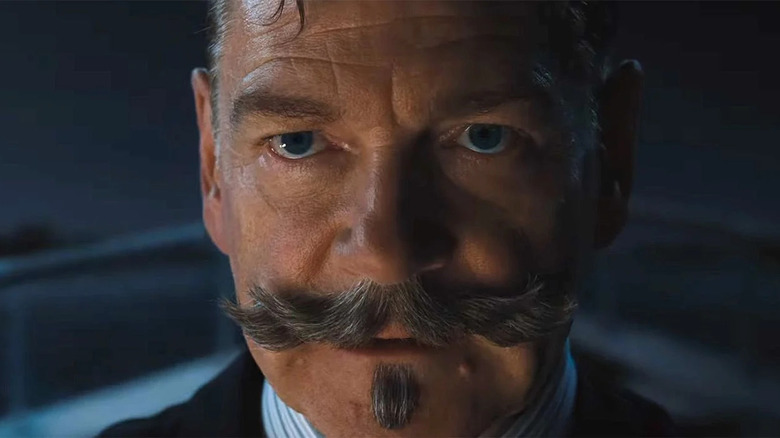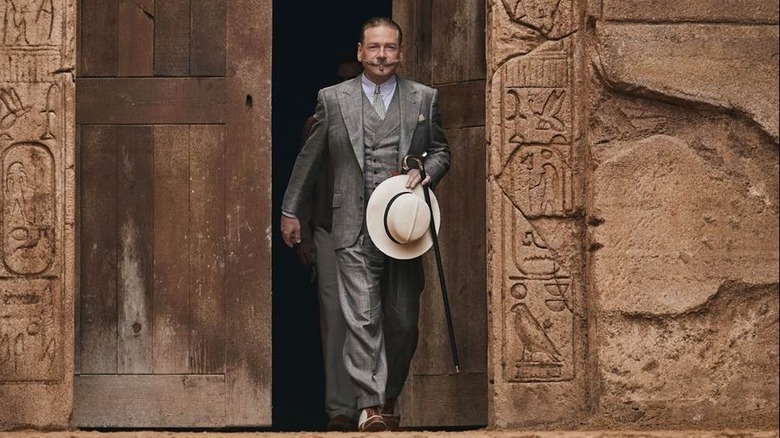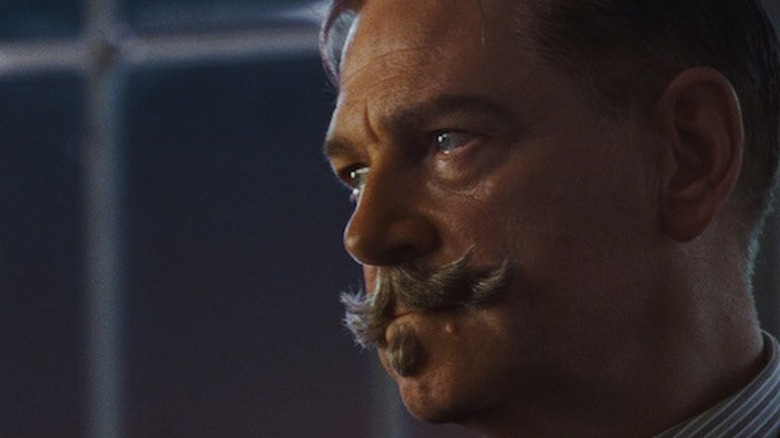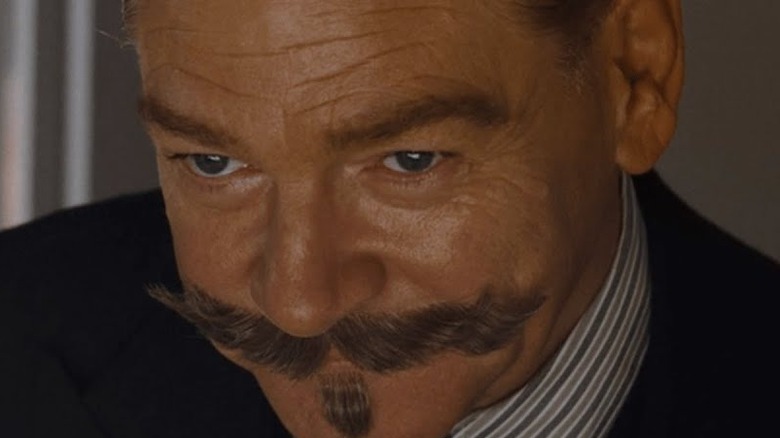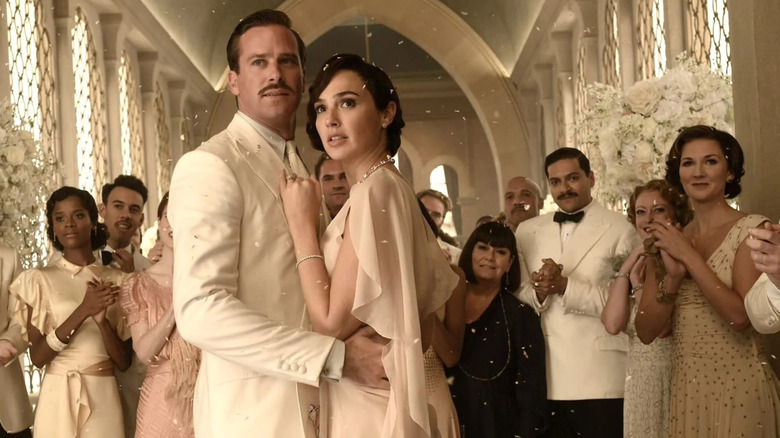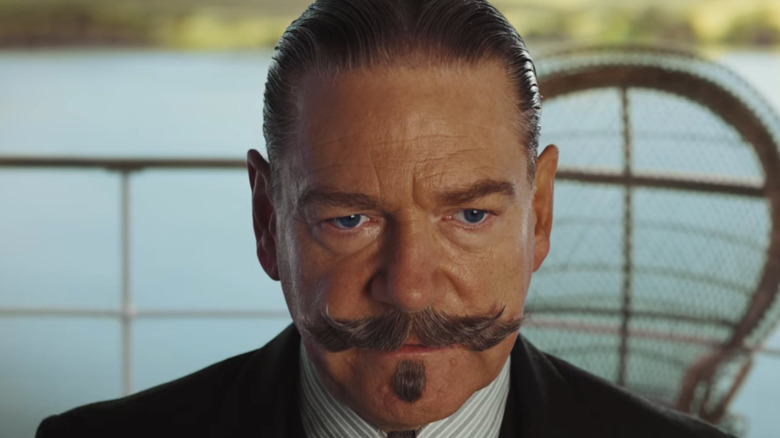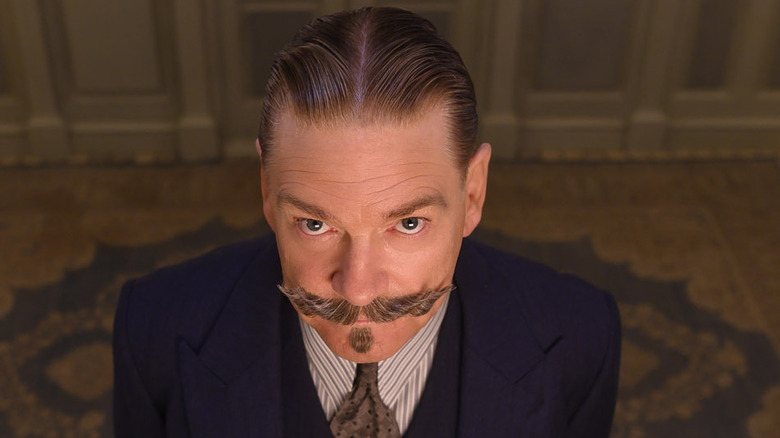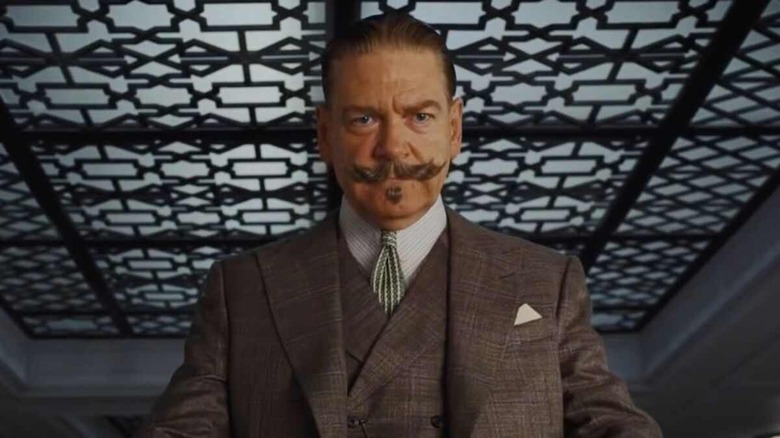Poirot's Mustache In Death On The Nile Is More Important Than You Think
Hercule Poirot is one of the most famous fictional detectives of all time, right up there with Sherlock Holmes, Joe Friday, and Batman. Originally created by author Agatha Christie in her 1920 novel, "The Mysterious Affair at Styles," Poirot went on to appear in 33 novels and 50 short stories, as well as numerous stage, cinema, and television adaptations. While Poirot's characterization and backstory have varied from adaptation to adaptation, one element has always been consistent: his beautiful mustache.
The latest version of Hercule Poirot is brought to life by director/star Kenneth Branagh, who boasts one of the biggest and most luxurious mustaches ever caught on film. But it's not just a meme-worthy piece of fur; it's an integral part of his character. Branagh introduced audiences to his version of Poirot in 2017's "Murder on the Orient Express," which hinted at a elements of pathos to the character unseen in Christie's initial incarnation of the character. In "Death on the Nile," Branagh (and writer Michael Green) greatly expand upon Poirot's backstory and imbue him with tragic gravitas, much of which is directly connected to his mustache, both literally and thematically.
Let's dive deep into Poirot's mustache in "Death on the Nile" is more important than you realized. Consider this your spoiler warning.
Poirot in WWI
"Death on the Nile" begins with a prologue set during World War I, more than 20 years before the main events of the movie. The sequence features Poirot as a young soldier who advises his commanding officer how best to ambush an enemy encampment. He uses his powers of deduction to know when the wind will be in their favor, indicating the best time to attack under the cover of a sheet of poison gas and other horrific World War I battle tactics.
During this sequence, Poirot is completely clean shaven, without a hint of the mustache that would come to define him. He's also de-aged with cutting edge computer graphics technology. While Poirot doesn't have his signature facial hair, his commanding officer does. The viewer is initially led to believe the Poirot is the officer, until Branagh makes his appearance.
Poirot's Commanding Officer
During the prologue, the commanding officer follows Poirot's insight and advice, and the result is a decisive victory for the unit. Had it not been for Poirot, it's likely the enemy force would have killed them all. But thanks to Poirot's observation of the birds and their behavior with the wind, they were able to strike at the exact right moment with the wind at their backs. They cross "no man's land" and force the enemy to retreat without a single casualty ... until Poirot realizes that his commanding officer is about to step on an explosive tripwire trap. He shouts a warning, but it's too late, and the explosion kills the officer — just as he thanks Poirot for saving the day.
Due to the resemblance between the officer's mustache and the one Poirot would eventually become known for, it's implied the detective wears his distinct facial hair as a tribute to his fallen comrade. No matter how many lives he saved that day, he will always be haunted by the one he could not. Poirot may be the greatest detective of all time, but even his skills were not enough to save his commanding officer.
Poirot's War Injury
The blast that killed Poirot's commanding officer also wounded the young Poirot, who was standing close by when it happened. The scene after the explosion sees Poirot in a field hospital, visited by the love of his life, Katherine. During their conversation, he turns to face her, revealing that his face is disfigured. To her credit, Katherine takes the disturbing sight of Poirot's wound in stride, telling him that, in order to cover it up, he should grow a mustache.
Indeed, the mustache worn by Branagh's Poirot manages to completely cover his war wound. In his career as a detective, Poirot's chief flaw is his egotistical vanity; he's the best at what he does, and he knows it. His impeccably maintained mustache represents his narcissism, but it also literally covers up his biggest flaw — the battle scars that define his first, and greatest, failure.
It's worth noting that none of this characterization was part of Agatha Christie's original vision of Poirot, who never served in WWI or suffered facial scars — it's all the creation of the "Death on the Nile" filmmakers. Kenneth Branagh told Parade that it's attempt to more deeply characterize Poirot while contextualizing his most famous physical trait: that très chic facial hair.
Katherine
Another character created for the Kenneth Branagh iteration of Hercule Poirot is the one true love of his life, Katherine. She's alluded to in "Murder on the Orient Express" in the form of a photograph Poirot keeps with him at all times, but she makes a proper appearance in "Death on the Nile" during the opening flashback sequence. She's the one who kindly commands Poirot to grow a mustache to cover up his war injury, and they seem to really love each other. By the time the story picks up in the present day, Katherine is long gone, but it takes a while for the viewer to discover what happened to her.
Poirot eventually explains that she died in an train accident while coming to see Poirot in the hospital during Christmas, after he insisted that she come to spend the holiday with him. He feels guilty for her death, and it feels like he wears the mustache (in addition to the aforementioned reasons) as a tribute to her, since it was her idea for him to wear it in the first place. The end result is that the mustache represents Poirot's responsibility to those he failed, to those he loves, and to his work as the world's greatest detective.
The final scene
The final scene of "Death on the Nile" sees Poirot visit the blues singer, Salome Otterbourne (Sophie Okonedo). She was present on the S.S. Karnak during the mystery, and the two unexpectedly hit it off, though Poirot tends to shy away from any sort romantic entanglements, for fear of it getting in the way of his detective work, and to avoid feeling unfaithful to his late muse, Katherine. Still, she clearly found him intriguing, and even his futile efforts to hide his attraction to her didn't do much.
When Poirot turns his face to the camera, viewers are, no doubt, shocked to see that he's shaved his iconic mustache — revealing the flawed visage he had spent years covering up. The film ends on that image, leaving the audience to ponder what it means for Poirot to have shaved his mustache while seemingly pursuing a romantic relationship with Ms. Otterbourne.
Why did Poirot shave his mustache?
Over the course of "Death on the Nile," viewers learn to see Poirot's mustache as a symbol of his work, his ego, and the people he lost along the way — particularly his wartime commanding officer and his lost love. Shaving his mustache is more than just a fashion choice; it's a turning point for his character, one that leaves him on an uncertain precipice. His ego has been completely broken down and he no longer believes in himself as a detective. He is not pursuing love alongside his career; he is pursuing love because he has abandoned his career. Earlier in the film, he says that he doesn't do romance because, "I have my cases." This implies he has given up his career as a detective.
Shaving his mustache also means he's let go of his ego. After failing Bouc (Tom Bateman), he feels undeserving of his reputation as a celebrity detective. He has abandoned that life. As to what he will do now ... Well, that depends on whether or not Kenneth Branagh gets to make another Poirot film. If this is the last time Branagh plays Hercule, then it's implied that he will never investigate another case, and will instead retire and pursue a relationship with Ms. Otterbourne. But if Branagh does turn this story into a trilogy, then perhaps we'll see Poirot confront his destiny as a detective and try to reconcile the fact that even the greatest among us are capable of failure.
Poirot's trades his mustache for scars
The image of Poirot without his mustache is evocative, because his face is still distinct. While less traditionally handsome (not that his mustache was particularly traditional), the scars on his face still mean that anyone who sees Poirot will instantly recognize him. Poirot, for his part, values symmetry within the human form (note how he asks men to straighten their uneven ties, and how his own hair is usually parted down the middle). His scars completely shatter that desire, drawing lines of chaos across his upper lip and around his mouth.
Eventually, Poirot will have to discover that it's not about maintaining his perfect visage, but about pursuing justice and speaking for victims who have been silenced by evildoers. Poirot's investigative prowess has long stoked his ego, but without his ego, he can become an even greater detective. Poirot did not save his commanding officer in the war, but he did try, and his scars are a reminder of that effort.
There is a relevant Elbert Hubbard quote: "God will not look you over for medals, diplomas, or degrees –- but for scars." Life isn't about coasting to easy victories and emerging unscathed. It's about suffering defeat and finding a way to move forward, even without certainty of success. That's where true victory lies, and where Poirot's story will likely go ... If Kenneth Branagh gets the opportunity to make a third Poirot movie.
